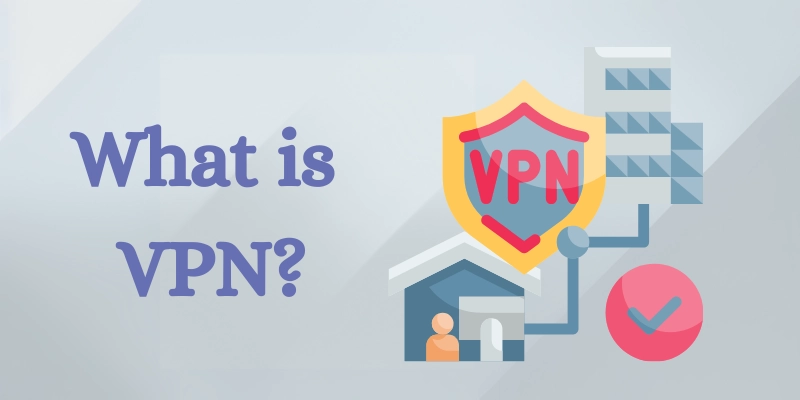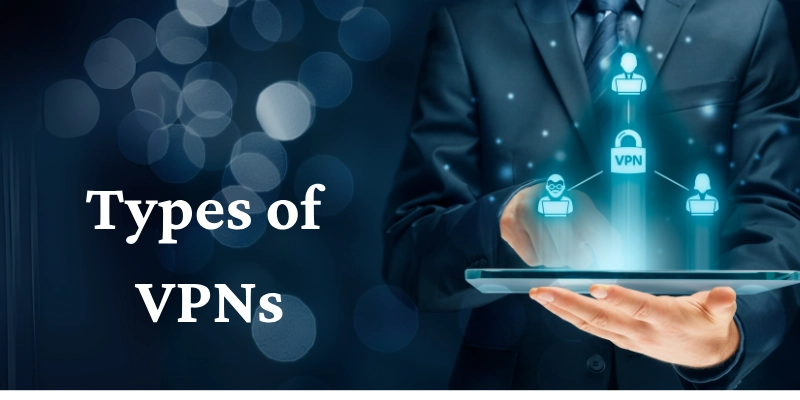Different Types of VPN and Their Uses
Published: 30 Jun 2025
In today’s digital world, Virtual Private Networks (VPNs) have become essential tools for ensuring privacy, security, and access to restricted content. VPNs cater to a variety of user needs, and understanding the different types can help you choose the right solution for your specific requirements.
Below, we provide a detailed exploration of the various types of VPNs, their features, and their applications.
What Is a VPN and Why Is It Important?
A Virtual Private Network (VPN) is a secure connection that encrypts data between your device and the internet. It ensures privacy, protects sensitive information, and bypasses geographical restrictions on content. With increasing cyber threats and surveillance, VPNs are indispensable for individuals and businesses.

Types of VPNs
Below are the different types of VPNs commonly used for various needs. Each type offers unique features designed to enhance security and accessibility.
- Remote Access VPN
- Site-to-Site VPN
- Client-Based VPN
- Network-Based VPN
- Mobile VPN
- Personal VPN
- Corporate VPN
- Peer-to-Peer (P2P) VPN
- Cloud VPN
- Hardware VPN
- SSL VPN
1. Remote Access VPN
Remote Access VPNs are the most common type, designed for individual users to securely connect to a private network from remote locations. They encrypt the connection, ensuring data remains secure even when using public Wi-Fi.
Features:
- Easy to use with dedicated VPN applications.
- Secure access to private resources.
- Ideal for remote workers and frequent travelers.
Applications:
- Protecting sensitive information while working remotely.
- Accessing geo-restricted content.
2. Site-to-Site VPN
Site-to-site VPNs connect entire networks in different locations, allowing organizations to communicate seamlessly between branches.
Features:
- High scalability for large organizations.
- Secures data exchange between different offices.
- No need for individual VPN setups for users.
Applications:
- Linking corporate headquarters with branch offices.
- Facilitating secure data transfer in multinational organizations.

3. Client-Based VPN
A Client-Based VPN requires users to install software or applications on their devices. This type of VPN creates a direct connection between the user’s device and the VPN server.
Features:
- Full control over the VPN settings.
- Strong encryption protocols.
- Compatible with most operating systems.
Applications:
- Protecting individual user activity.
- Enhancing security for remote work.
4. Network-Based VPN
Network-based VPNs are implemented at the network level, typically within a data center or a router. They provide a blanket of security for all devices connected to the network.
Features:
- Centralized security management.
- Seamless integration into existing infrastructure.
- No need for individual device setup.
Applications:
- Large-scale enterprise solutions.
- Protecting multiple devices on a single network.
5. Mobile VPN
Designed for mobile devices, Mobile VPNs offer secure access to private networks even while users are on the move. They maintain a consistent connection regardless of changes in network types (e.g., Wi-Fi to cellular).
Features:
- Persistent connections across various networks.
- Optimized for battery efficiency.
- Robust encryption for mobile devices.
Applications:
- Professionals travel frequently.
- Securing mobile banking or sensitive communications.
6. Personal VPN
Personal VPNs are user-friendly services tailored for individuals seeking privacy, anonymity, and access to restricted content.
Features:
- Easy-to-install apps for desktops and smartphones.
- Multiple server locations worldwide.
- Strong focus on privacy and no-logs policies.
Applications:
- Streaming geo-restricted content (e.g., Netflix, Hulu).
- Preventing ISP tracking.
7. Corporate VPN
Corporate VPNs are designed specifically for business environments to provide employees with secure access to company resources.
Features:
- Customizable security policies.
- Integration with existing IT systems.
- Supports multi-factor authentication.
Applications:
- Enabling secure remote work for employees.
- Protecting sensitive corporate data.
8. Peer-to-Peer (P2P) VPN
P2P VPNs are optimized for file-sharing applications, ensuring anonymity and security for users engaging in peer-to-peer activities.
Features:
- High-speed connections for file transfers.
- Protection against ISP throttling.
- Specialized servers for P2P traffic.
Applications:
- Secure torrenting.
- Sharing large files over distributed networks.
9. Cloud VPN
Cloud VPNs, also known as virtual private cloud (VPC) services, provide secure access to cloud-based resources. They are widely used in businesses migrating their data to the cloud.
Features:
- Scalability and flexibility.
- Simplified deployment and management.
- Supports hybrid cloud environments.
Applications:
- Secure access to cloud storage and applications.
- Hybrid or fully cloud-based IT infrastructures.
10. Hardware VPN
Hardware VPNs are physical devices dedicated to establishing secure VPN connections. These standalone devices are often used by enterprises requiring high levels of security.
Features:
- Hardware-level encryption.
- Supports multiple simultaneous connections.
- No dependency on external software.
Applications:
- Enterprises managing sensitive data.
- Organizations with a high volume of VPN traffic.
11. SSL VPN
SSL VPNs utilize Secure Sockets Layer (SSL) encryption to enable secure access through a web browser. Users don’t need to install software to use this VPN type.
Features:
- Browser-based access.
- Strong encryption standards.
- Ideal for environments with limited software installation permissions.
Applications:
- Accessing corporate portals securely.
- Simplifying VPN access for non-technical users.
Choosing the Right VPN
When selecting a VPN, consider your specific needs:
- Are you a business looking to secure multiple office locations? A Site-to-Site VPN may be ideal.
- Are you an individual seeking privacy? Opt for a Personal VPN.
- Need a secure connection while traveling? Choose a Mobile VPN.
Understanding these distinctions ensures that you choose the best VPN for your goals.
Conclusion
In conclusion, exploring the various Types of VPNs can unlock enhanced privacy, security, and freedom online, whether for personal use, work, or travel. Each type offers unique benefits, but it’s crucial to choose wisely avoid free or unreliable services that may compromise your data, and opt for providers with strong privacy policies and robust encryption. Take the first step toward safer and freer internet access, empowering yourself to navigate the digital world with confidence and peace of mind.
Don’t forget to leave a comment and share your thoughts or experiences with VPNs. Your insights might help others on their journey to safer internet use!
FAQs
Here are some important FAQs to help you better understand VPNs and their use.
Remote access VPN links individual users to a network, while site-to-site VPN connects two networks directly.
Monitoring SSH channels helps detect unauthorized access, prevent data breaches, and ensure that only trusted users are interacting with sensitive systems. It strengthens overall cybersecurity by keeping logs and alerting admins to suspicious activity.
OpenVPN, L2TP/IPsec, and IKEv2/IPsec are among the best protocols for remote access due to their balance of speed, security, and compatibility with various operating systems. They help maintain encrypted and reliable connections for remote users.
Each VPN type serves a specific purpose—remote access VPNs suit individuals working from anywhere, while site-to-site VPNs are ideal for connecting business networks. Choosing the right type ensures efficient performance, better control, and enhanced data security.
Yes, you can switch depending on your needs. For instance, you might use a remote access VPN when working from home and a site-to-site VPN to maintain secure communication between office networks, but each requires a suitable configuration.
PPTP is one of the oldest VPN protocols, offering fast speeds but lower security due to outdated encryption. OpenVPN, on the other hand, provides robust security and flexibility, though it may slightly reduce speed due to stronger encryption protocols.
Yes, each device should have VPN protection to ensure complete privacy and security. Many VPN providers allow multiple device connections under one subscription, making it easier to protect your entire digital environment.

- Be Respectful
- Stay Relevant
- Stay Positive
- True Feedback
- Encourage Discussion
- Avoid Spamming
- No Fake News
- Don't Copy-Paste
- No Personal Attacks

- Be Respectful
- Stay Relevant
- Stay Positive
- True Feedback
- Encourage Discussion
- Avoid Spamming
- No Fake News
- Don't Copy-Paste
- No Personal Attacks





